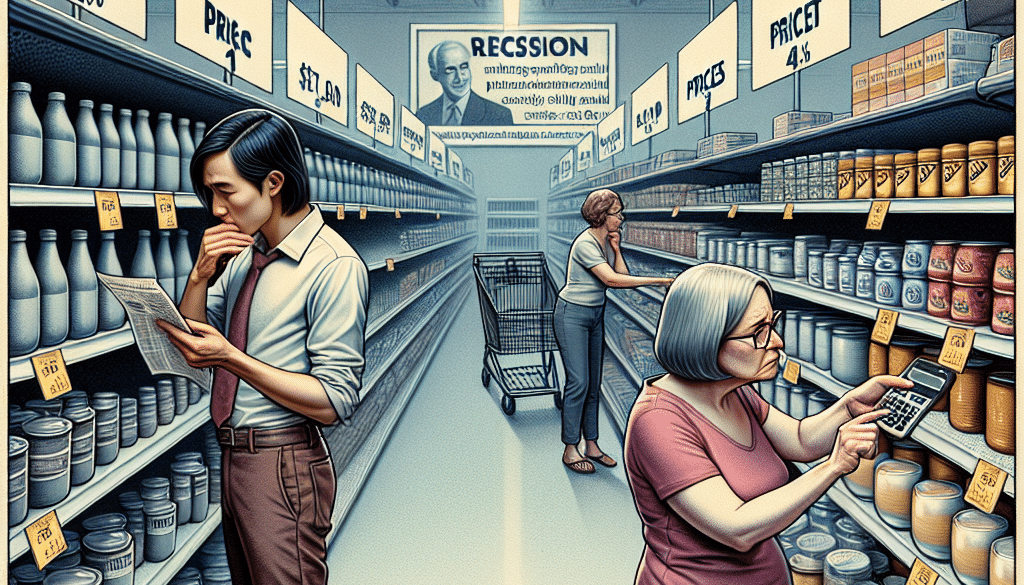Innovating for Recession-era Changes in Consumer Behaviour
-
Table of Contents
- Innovating for Recession-Era Changes in Consumer Behavior
- Understanding Recession-Era Consumer Behavior
- Strategies for Innovation During a Recession
- Optimizing Product Offerings
- Enhancing Digital Experiences
- Emphasizing Sustainability and Ethics
- Flexible Pricing and Payment Options
- Case Studies: Successful Innovations in Past Recessions
- Adapting Marketing Strategies for Recessionary Times
- Conclusion: Key Takeaways for Businesses
- ETChem: Meeting Your Protein Needs with Quality Collagen Products
Innovating for Recession-Era Changes in Consumer Behavior

As the global economy braces for the impact of a potential recession, businesses are closely monitoring shifts in consumer behavior. Economic downturns historically lead to changes in spending habits, with consumers becoming more cautious and value-conscious. Companies that can quickly adapt and innovate in response to these changes are more likely to thrive. This article explores how businesses can innovate to meet the evolving needs of consumers during a recession.
Understanding Recession-Era Consumer Behavior
During a recession, consumers tend to prioritize essential over discretionary spending. They look for ways to stretch their budgets, often by seeking out promotions, discounts, and more affordable alternatives. Brand loyalty can wane as price becomes a more significant factor in purchasing decisions. Additionally, consumers may delay large purchases, focus on debt reduction, and increase their savings rate.
- Increased demand for value and affordability
- Shift towards more cost-effective products and services
- Preference for multi-functional and long-lasting items
- Greater interest in DIY solutions and self-service options
Strategies for Innovation During a Recession
Businesses must be proactive in their approach to innovation during economic downturns. Here are some strategies that can help companies stay relevant and maintain customer engagement:
Optimizing Product Offerings
Companies can re-evaluate their product lines to focus on items that offer greater value. This might involve introducing more affordable versions of popular products or bundling items to create perceived savings. For example, during the 2008 recession, many fast-food chains successfully introduced value menus that appealed to budget-conscious consumers.
Enhancing Digital Experiences
With more consumers turning to online shopping to compare prices and find deals, businesses must invest in their digital platforms. Enhancing the user experience, offering personalized recommendations, and providing seamless customer service can differentiate a brand in a crowded online marketplace.
Emphasizing Sustainability and Ethics
Even during a recession, many consumers remain committed to sustainability and ethical practices. Companies that highlight these aspects of their business can maintain a loyal customer base and attract new consumers who prioritize these values.
Flexible Pricing and Payment Options
Introducing flexible pricing strategies, such as pay-what-you-can models or subscription services with various tiers, can accommodate consumers with different budget constraints. Payment plans and financing options can also make larger purchases more accessible during tough economic times.
Case Studies: Successful Innovations in Past Recessions
History provides several examples of companies that have successfully innovated during recessions:
- Hyundai’s Assurance Program: During the 2009 recession, Hyundai launched an assurance program that allowed customers to return their cars if they lost their jobs. This innovative approach alleviated consumer fears and led to a significant increase in sales.
- Netflix’s Subscription Model: As the economy slowed down in the early 2000s, Netflix capitalized on the situation by offering a subscription-based model that provided unlimited rentals for a flat monthly fee. This value proposition helped Netflix gain market share from traditional rental stores.
- Apple’s Continued Innovation: Apple introduced the iPod at the peak of the dot-com bust and later the iPhone during the 2007 economic downturn. These products revolutionized the market and established Apple as a leader in innovation.
Adapting Marketing Strategies for Recessionary Times
Marketing during a recession requires a delicate balance between sensitivity to consumer challenges and the promotion of products and services. Companies should focus on empathetic messaging that resonates with the current consumer mood. Highlighting the value and durability of products, offering helpful tips on saving money, or providing educational content can build trust and loyalty.
Conclusion: Key Takeaways for Businesses
Innovating for recession-era changes in consumer behavior involves understanding the new priorities of consumers, adapting product offerings, enhancing digital experiences, and maintaining a commitment to sustainability and ethics. By employing flexible pricing strategies and empathetic marketing, businesses can navigate the challenges of a recession and emerge stronger.
ETChem: Meeting Your Protein Needs with Quality Collagen Products
In light of the changing consumer behavior towards health and wellness during economic downturns, ETChem’s protein products stand out as an excellent choice. Their high-quality collagen products cater to the increased consumer demand for affordable, health-conscious options. Whether you’re a distributor, trader, or manufacturer in the nutraceutical, pharmaceutical, or food and beverage industries, ETChem offers a range of collagen solutions to meet your needs.
About ETChem:
ETChem, a reputable Chinese Collagen factory manufacturer and supplier, is renowned for producing, stocking, exporting, and delivering the highest quality collagens. They include marine collagen, fish collagen, bovine collagen, chicken collagen, type I collagen, type II collagen and type III collagen etc. Their offerings, characterized by a neutral taste, instant solubility attributes, cater to a diverse range of industries. They serve nutraceutical, pharmaceutical, cosmeceutical, veterinary, as well as food and beverage finished product distributors, traders, and manufacturers across Europe, USA, Canada, Australia, Thailand, Japan, Korea, Brazil, and Chile, among others.
ETChem specialization includes exporting and delivering tailor-made collagen powder and finished collagen nutritional supplements. Their extensive product range covers sectors like Food and Beverage, Sports Nutrition, Weight Management, Dietary Supplements, Health and Wellness Products, ensuring comprehensive solutions to meet all your protein needs.
As a trusted company by leading global food and beverage brands and Fortune 500 companies, ETChem reinforces China’s reputation in the global arena. For more information or to sample their products, please contact them and email karen(at)et-chem.com today.




